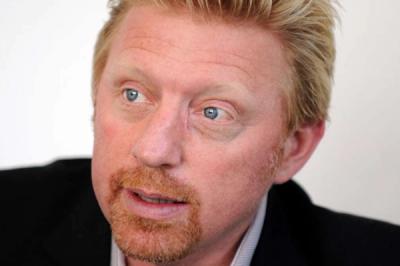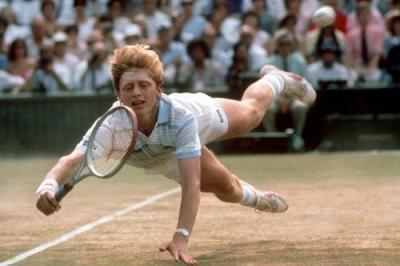Boris Becker Talks Sneakers And 80s Tennis With SF
Tennis trophies, trophy wives, trophy life – Boris Becker . 'Baron Von Slam' was the precocious boss of the pro tennis game in the 1980s; he stormed Wimbledon as a 17-year-old, backed it up the next year to prove it was no accident and ended his enviable career with six Grand Slam titles. He did it all with a swagger that shattered the mold of the stern German stereotype, while accruing a spectacular flock of fangirls along the way – a most rare achievement for a red-head. The shoe that was on his feet for the start of that reign, the , is being reissued and Sir Boom Boom was in town to promote it. We scored some time with him and talked about the sneaker bring-back and changes in pro tennis...
We're looking at the Puma Boris Becker retro model now, is this year's release any different to the original?
I think it's exactly the same. Obviously technology has changed. This shoe was very, very modern when it came out. It was groundbreaking because it was the first half-top tennis shoe, and I needed that to support my ankles, with my particular style. And 30 years later I think it's still very valid.
As a pro court shoe or a casual sneaker?
As a tennis shoe and as a shoe you're very comfortable in. I always needed to be comfortable on the court, so that was a focus, and that's important with casual shoes.
So would wearing this pair of shoes from the 80s to play in today not be unthinkable?
No, I would wear it. It was made for my foot, though.
We hear a lot about new technologies in sports shoes every year. Is it a beat-up, though? How far do you think athletic shoe development has come?
I think they're different, but every player has different specs, and different needs in a shoe. Obviously when you're a runner you want a very light shoe. But I wasn't a runner, I was more of a power guy who came up to the net. So I needed a very strong shoe to support my ankles.
You were wearing it at your first Wimbledon, right?.
Yes.
Did they say Boris Becker on them?
Not the first year, I don't think, but definitely the second year.
So it started off as a general Puma model?
Yeah, it was a general Puma shoe. Then I won Wimbledon, and Puma realised that I would be a good endorsement for this shoe.
Were you signed to them already, at that time?
Yep, for shoes and racquets.
How did that partnership come about when you were so young, and an unproven player on the pro scene?
Puma is a German company, I'm German. I always loved Puma. I've met Mr (Rudi) Dassler a lot of times, so we started the relationship. It goes way back.
Your son, Noah, was featured in a promo for the retro shoes. What does it feel like having a younger generation wear shoes with your name on them as fashion items?
I don't take it for advantage. Young people have their choices for shoes – with the Internet and social media, there's a lot of opinion on what's trendy and comfortable and you make your own mind up. So for him to actually like the shoe, and wearing it and being part of the campaign, is a compliment as a father. He wouldn't do it if he didn't believe in it, that's how I raised him.
http://youtu.be/qqiXJNFG4vY
It doesn't seem possible for a 17-year old in today's game to win a Grand Slam?
No, it doesn't. Every record will be broken eventually, though. But at the moment as we speak, the top tennis players seem to develop in their mid-twenties. That's the trend at the moment. Maybe soon we'll have teenagers coming up left and right and the chances will increase that another 17-year-old will win a Grand Slam.
What's changed about the game that has caused this? Does modern tennis require bigger bodies; the kind of muscle mass that is only possible once you're fully grown?
We all have different philosophies on why it's different now. I personally think a lot of it has to do with expectations. Now when young players start hitting the ball well, people notice and that puts you under more pressure. Not everybody can handle the pressure, but once you're in your twenties you can handle the expectations better. I think in my day, you didn't have social media, Internet – so you didn't know how good you were. You didn't believe the hype because it wasn't there. Now, the whole tennis community hails you as a new superstar when you're still young before winning anything. I think that's the main problem.
You didn't feel the pressure back then?
I felt it because I put it upon myself, but it wasn't because people were putting pressure on me. Having said that, once I won at 17, I became an overnight superstar in sport and then when I had to come back and do it again the next year, that's when I really felt the pressure.
Michael Chang was a great player, but he surely fluked the win in 1989. Were you surprised to win Wimbledon so young? Did you feel like you got lucky and you had to revel in that moment because it might not come around again, or were you sure it was just the start of huge things?
You never know, you just don't know. You have your hopes and expectations, so coming back the following year and defending my title was the biggest tournament of my life. Once I came back and won that, I felt like I belonged, it got easier.
You said it was surprise to your family that you became a pro tennis player. That seems strange, how was your talent not apparent?
In the mid-80s, you just didn't become a professional sportsperson, period. It just didn't happen. You started sports after school, meaning you were 20 or 21. So for me to give going pro a try at 16 was unheard of. You can break your ankle, then it's over, your career is over. My parents didn't have a sporting background, so they believed, like most people, you had to get your education, get your degree, become a doctor, become a lawyer – something more serious than a sportsman.
Did you ever wish you could experience being anonymous, go to university and get a 'normal' job?
Not at all. I was very independent at 16, 17. I think teenagers loved to be independent then, because parents usually make all the decisions for you. So winning a couple of tournaments and making a bit of money gave you the freedom to do what you wanted to do. I had more freedom than a normal teenager. So I don't think I missed out. I was able to make the decision on whether I would go to work tomorrow or not, that's pretty cool.
You'd achieved a lot by your early twenties, like championships and accolades, did you ever become bored with the tennis touring life?
Sure, you had moments, when you were burned out. But because I was able to make decisions for myself, I was able to have a long career. I loved the sport and I loved winning, but it was my love for the game that was the reason I wanted to play as long as I could. Nowadays you have these tennis parents that put more pressure on their kids than necessary. It makes it difficult for the teenager to truly enjoy the game. That wasn't the case in my life, I was playing because I wanted to.
Throughout your career, who was your favourite player to beat?
I didn't have one. Whether it was the first round, quarter-final or final, they all mattered. The names may have been Lendl, McEnroe, Sampras and Agassi, but even the first round against an unknown I had to play and had to win, so it was just as important.
Thanks to Boris for speaking to us. We don't know about that last diplomatic answer, though. Surely felt better than cruising against a no-name! The Puma Boris Becker is now in-stores across the globe (or due very soon), read more about that release .

